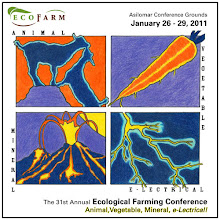
Only the knife knows what goes on in the heart of a pumpkin.
Simone Schwarz-Bart
This time of year, we go a little pumpkin crazy at our house. Pumpkin soup, pumpkin bread, pumpkin pasta, muffins, and on it goes. We look forward to it all year and savor the smells and special foods through November. Right now I have a huge tray of pumpkins and squash on our dinner table--a pumpkin bouquet.
There's a lot more to pumpkins than good looks and flavor. Pumpkins are indigenous to the US and were once a Native American staple. Nutritionally, they're packed with good stuff like vitamins A and C, B vitamins, iron, potassium, magnesium, and folate, among other nutrients. They're said to be good for blood sugar metabolism and provide immune support.
We like organic sugar pie pumpkins and have been buying them at the Farmers' Market for the last two weeks. They're smaller and easier to carry and are sweet, flavorful, and go a long way for their size. One sugar pie pumpkin makes a small pot of soup or a pie or muffins for instance.
Buy pumpkins that are heavy for their size and solid with no soft spots. If you don't have time for fresh pumpkin dealings, Trader Joes has some great canned organic pumpkin (their cans are among the very few that are BPA free) for under two dollars that I use every year with great results in baking.




































